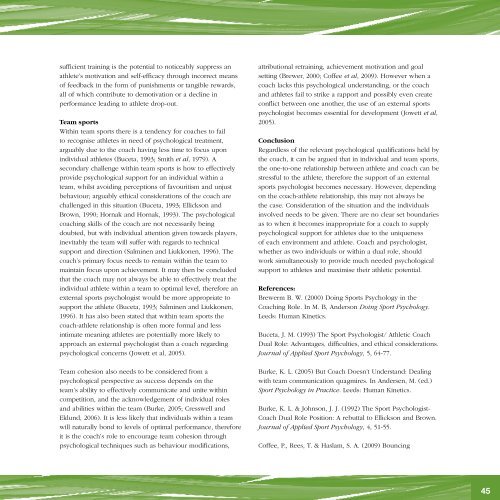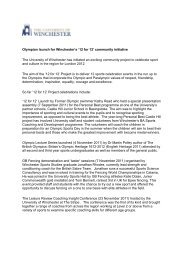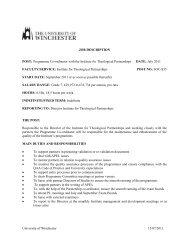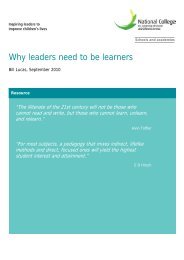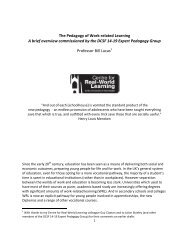alfred 2 - University of Winchester
alfred 2 - University of Winchester
alfred 2 - University of Winchester
Create successful ePaper yourself
Turn your PDF publications into a flip-book with our unique Google optimized e-Paper software.
sufficient training is the potential to noticeably suppress an<br />
athlete’s motivation and self-efficacy through incorrect means<br />
<strong>of</strong> feedback in the form <strong>of</strong> punishments or tangible rewards,<br />
all <strong>of</strong> which contribute to demotivation or a decline in<br />
performance leading to athlete drop-out.<br />
Team sports<br />
Within team sports there is a tendency for coaches to fail<br />
to recognise athletes in need <strong>of</strong> psychological treatment,<br />
arguably due to the coach having less time to focus upon<br />
individual athletes (Buceta, 1993; Smith et al, 1979). A<br />
secondary challenge within team sports is how to effectively<br />
provide psychological support for an individual within a<br />
team, whilst avoiding perceptions <strong>of</strong> favouritism and unjust<br />
behaviour; arguably ethical considerations <strong>of</strong> the coach are<br />
challenged in this situation (Buceta, 1993; Ellickson and<br />
Brown, 1990; Hornak and Hornak, 1993). The psychological<br />
coaching skills <strong>of</strong> the coach are not necessarily being<br />
doubted, but with individual attention given towards players,<br />
inevitably the team will suffer with regards to technical<br />
support and direction (Salminen and Liukkonen, 1996). The<br />
coach’s primary focus needs to remain within the team to<br />
maintain focus upon achievement. It may then be concluded<br />
that the coach may not always be able to effectively treat the<br />
individual athlete within a team to optimal level, therefore an<br />
external sports psychologist would be more appropriate to<br />
support the athlete (Buceta, 1993; Salminen and Liukkonen,<br />
1996). It has also been stated that within team sports the<br />
coach-athlete relationship is <strong>of</strong>ten more formal and less<br />
intimate meaning athletes are potentially more likely to<br />
approach an external psychologist than a coach regarding<br />
psychological concerns (Jowett et al, 2005).<br />
Team cohesion also needs to be considered from a<br />
psychological perspective as success depends on the<br />
team’s ability to effectively communicate and unite within<br />
competition, and the acknowledgement <strong>of</strong> individual roles<br />
and abilities within the team (Burke, 2005; Cresswell and<br />
Eklund, 2006). It is less likely that individuals within a team<br />
will naturally bond to levels <strong>of</strong> optimal performance, therefore<br />
it is the coach’s role to encourage team cohesion through<br />
psychological techniques such as behaviour modifications,<br />
attributional retraining, achievement motivation and goal<br />
setting (Brewer, 2000; C<strong>of</strong>fee et al, 2009). However when a<br />
coach lacks this psychological understanding, or the coach<br />
and athletes fail to strike a rapport and possibly even create<br />
conflict between one another, the use <strong>of</strong> an external sports<br />
psychologist becomes essential for development (Jowett et al,<br />
2005).<br />
Conclusion<br />
Regardless <strong>of</strong> the relevant psychological qualifications held by<br />
the coach, it can be argued that in individual and team sports,<br />
the one-to-one relationship between athlete and coach can be<br />
stressful to the athlete, therefore the support <strong>of</strong> an external<br />
sports psychologist becomes necessary. However, depending<br />
on the coach-athlete relationship, this may not always be<br />
the case. Consideration <strong>of</strong> the situation and the individuals<br />
involved needs to be given. There are no clear set boundaries<br />
as to when it becomes inappropriate for a coach to supply<br />
psychological support for athletes due to the uniqueness<br />
<strong>of</strong> each environment and athlete. Coach and psychologist,<br />
whether as two individuals or within a dual role, should<br />
work simultaneously to provide much needed psychological<br />
support to athletes and maximise their athletic potential.<br />
References:<br />
Brewerm B. W. (2000) Doing Sports Psychology in the<br />
Coaching Role. In M. B, Anderson Doing Sport Psychology.<br />
Leeds: Human Kinetics.<br />
Buceta, J. M. (1993) The Sport Psychologist/ Athletic Coach<br />
Dual Role: Advantages, difficulties, and ethical considerations.<br />
Journal <strong>of</strong> Applied Sport Psychology, 5, 64-77.<br />
Burke, K. L. (2005) But Coach Doesn’t Understand: Dealing<br />
with team communication quagmires. In Andersen, M. (ed.)<br />
Sport Psychology in Practice. Leeds: Human Kinetics.<br />
Burke, K. L. & Johnson, J. J. (1992) The Sport Psychologist-<br />
Coach Dual Role Position: A rebuttal to Ellickson and Brown.<br />
Journal <strong>of</strong> Applied Sport Psychology, 4, 51-55.<br />
C<strong>of</strong>fee, P., Rees, T. & Haslam, S. A. (2009) Bouncing<br />
45


